| Reviews & Columns |
|
Reviews DVD TV on DVD Blu-ray 4K UHD International DVDs In Theaters Reviews by Studio Video Games Features Collector Series DVDs Easter Egg Database Interviews DVD Talk Radio Feature Articles Columns Anime Talk DVD Savant Horror DVDs The M.O.D. Squad Art House HD Talk Silent DVD
|
DVD Talk Forum |
|
|
| Resources |
|
DVD Price Search Customer Service #'s RCE Info Links |
|
Columns
|
|
|
Police Story/Police Story 2
In 10 Words or Less
A Jackie Chan classic and its solid sequel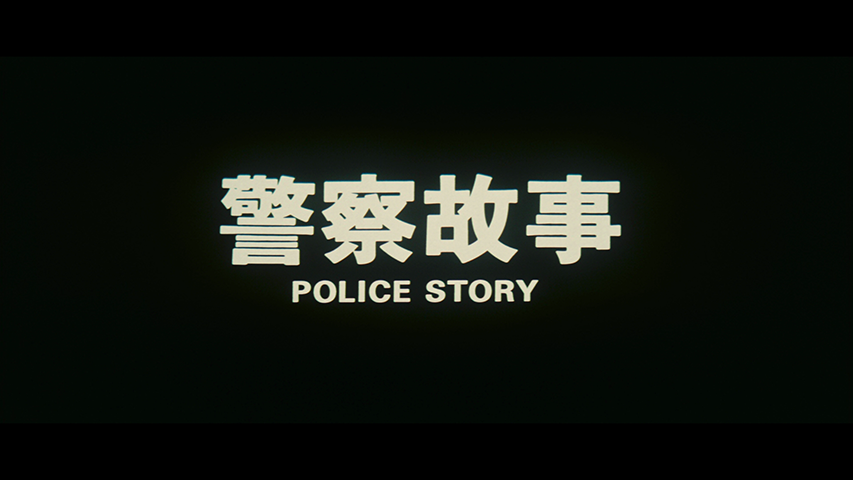
The Movie
Recent superhero movies have become entangled in a debate about the collateral damage of their battles, most notably after Batman vs. Superman, while Captain America: Civil War's plot is motivated by the issue of innocent bystanders getting caught in the crossfire. Though uninvolved people getting hurt isn't a major problem in Jackie Chan's intense combat in Police Story and Police Story 2, that doesn't mean there isn't a big problem with collateral damage. Between the two films, the amount of destruction that falls upon the homes, malls and other locations unlucky enough to play host to a fight is catastrophic, and that's a big part of why the films, especially the original, are such a delight to watch.In Police Story. Chan plays Chan Ka Kui, one of the police force's top officers, an upright defender of the public, as skilled with a gun as he is with his hands, as we immediately learn as a drug bust in a hillside shantytown goes sideways, and becomes an orgy of action, not letting up for the wild first 17 minutes, culminating in a thrilling bus chase involving an impressively wielded umbrella. Chan has a jealous girlfriend (Maggie Cheung) he doesn't spend enough time with and an assignment to protect Selina (Brigitte Lin), a drug lord's girlfriend recruited to testify in court. This puts him in the crosshairs of Chu, the leader of the drug ring, who will do whatever it takes to ruin Chan's career and keep himself out of trouble.
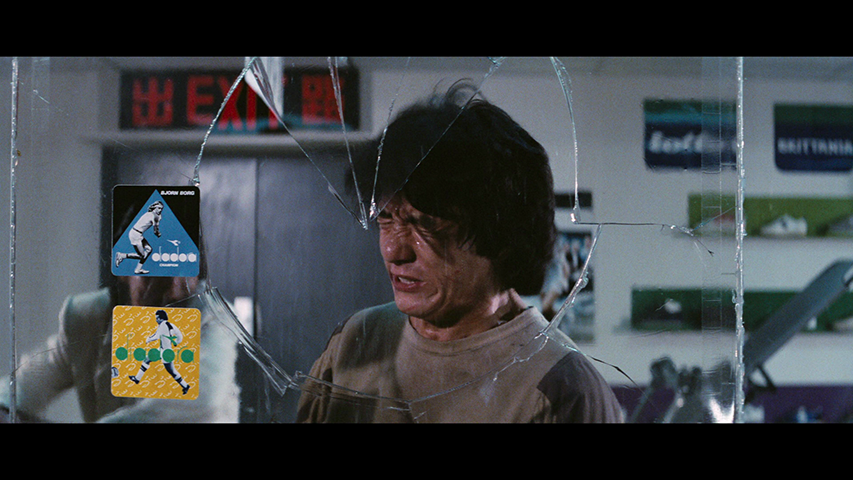
There are a number of simply remarkable action sequences in Police Story, with comedic beats and plot points distributed around them, keeping the pace quick and, though the comedy can be broad--including some old-school slapstick like a classic cake to the face and a pretty problematic sequence involving telephones at the understaffed police station--it all fits together in the film's heightened reality, particularly with a score that is best described as cartoonish during the film's lighthearted moments. It all builds to a symphony of broken glass in the finale, an extended fight/chase sequence that puts most of today's action filmmaking to shame. Though you could hardly consider what happens to be a satisfying resolution (the plot is not exactly the most engaging, existing mainly as a way to get from sequence to sequence), there's no doubt that no one is disappointed as the credits roll.

Trying to measure up to the first Police Story is something of a fool's errand, considering the incredible sequences that movie boasts, but the sequel handicaps itself in the effort by pulling back on the comedy--laughs are mainly the domain of Cheung's put-upon girlfriend and some minor potty humor--while blow-out fights are not really the order of the day. A playground beat-down and a climactic one-on-one finale are the most memorable battles, and while both are certainly impressive, most of the fights don't have the scale or pace of the original movie, trading punches and kicks for explosions in a somewhat misguided attempt for a larger impact. What works about the first film is the up-close intensity of bodies flying through breaking glass, not any kind of Michael Bay-level destruction (though the shantytown chase is an entertaining watch.)
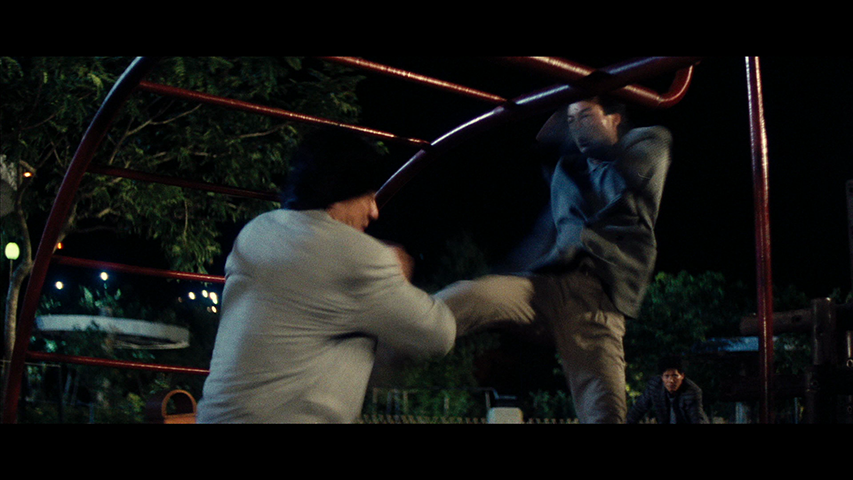
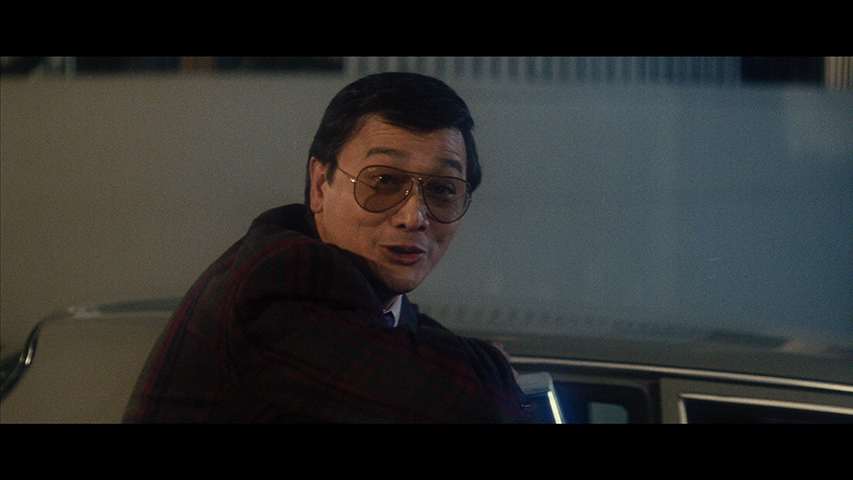
The Discs
Police Story (Criterion spine number 971) and Police Story 2 (number 972) arrive on two Blu-ray discs in a three-panel digipak with cover art for each film--held in a vertical slipcase-- and a fold-out, eight-panel poster. The traditional Criterion menus provides the choice to watch the films, select scenes, adjust languages and check out the special features. Audio options on each film include mono LPCM cantonese, 5.1 DTS-HD Master Audio Cantonese and 1.0 Dolby Digital English dubs, while subtitles are available in English.
The Quality
The 2.35:1 transfers on this release were struck from 4K restorations by Fortune Star Media, done at L'Immagine Ritrovata, using the original 35mm camera negatives. The resulting image is quite remarkable, with a crisp, bright image that's loaded with fine detail, making scenes like the chaotic opening scene of Police Story or the explosive finale of Police Story 2 wonders to behold. (Every pane of broken glass is easily noticed.) Compare any of the clips of the films in the archival extras to the main features and you can see how incredible an improvement this presentation is. That said, it is far from perfect, as black crush can be noticed in spots in both films, the color grading results in a film that's more drab and earthy than you'd expect, and several scenes in Police Story exhibit a distracting amount of blurriness, which may be a part of the source material, but it doesn't seem to be a stylistic choice. There doesn't look to be any problems introduced with the transition to digital though as the image is free of compression artifacts or unnatural smoothness.The mono LPCM Cantonese tracks are the ones to go for, especially with a new track--described somewhat confusingly by Criterion as being "restored from the original soundtrack negative, and its mix was confirmed against an out-of-print DVD track provided by Irongod2112 and sourced from a Japanese laserdisc release"--on the first film, as both are strong, well-prioritized tracks, that deliver the film as originally intended, with enough oomph to make the foley work and score--particularly the over-the-top music in the first film--come across nicely. The 5.1 DTS-HD Master Audio tracks are nothing to sneeze at however, with both utilizing the sides and rear to enhance the fullness of the sound, with the second film benefiting from the extra channels to create more discreet placement and a fuller soundfield for the film's more concussive moments.
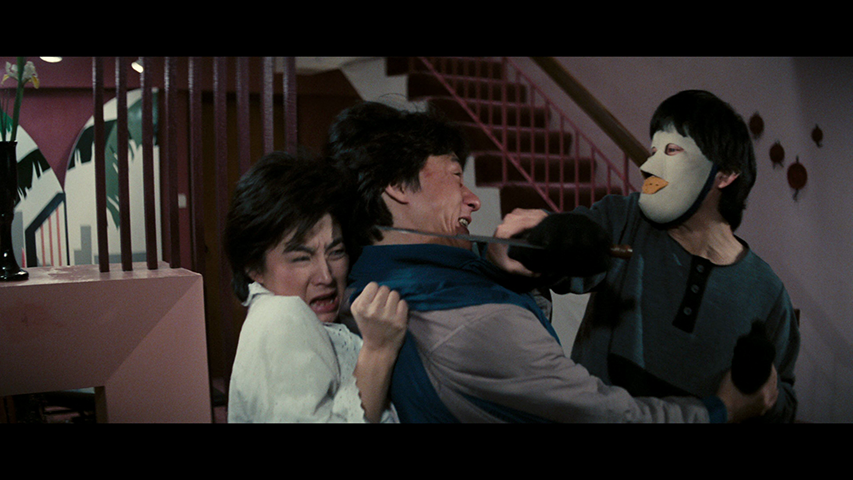
The Extras
The Police Story films have had a number of releases over the years, including a version-heavy limited-edition release last year from Eureka that's seemingly completely unavailable now. Between these many releases, there's been an assortment of bonus content, much of which is not on this release, including audio commentaries and some alternate cuts. That said, Criterion has provided a good deal of extras to check out.Starting with Police Story, the first extra isn't honestly so much an extra as an audio option, and that's the English dub. Per Criterion (and Eureka before them), this dub hails from the ‘80s and was sourced from a Dutch VHS copy provided by a fan, and is labelled as "fan-preferred". Listening to it, it's clear why, as the over-the-top performances give the film a very different feel, hardly sticking to the Chinese dialogue and adding a sense of goofiness to the whole affair. Most dubs are skippable, this one is worth a listen.
The true extras begin with the lengthy "Jackie Chan: My Stunts" (1:04:18), made up of excerpts from a documentary Chan made in 1999 (leaving out about 30 minutes from the original film.) Using clips from Chan's older films and demonstrations from the set, highlighted by several moments from Police Story, the featurette shows how Chan builds and executes his stunts, with his thoughts on the process and theory behind his work. There's also a look at Chan's stunt lab, where his team assists him in developing his bits, sometimes over innumerable attempts. If you enjoy his films, this is a fascinating peek behind the scenes, with Chan's charm adding to the enjoyment value.
Certain to be right in the wheelhouse of Criterion viewers is "The Superhuman Everyman" (13:25), a new interview with director Edgar Wright, The Scott Pilgrim vs. The World helmer talks of how he was introduced to Chan's work, his favorite films in Chan's canon and his appreciation for Police Story (while also touching on its sequel), as well as what makes the filmmaker so appealing. It's followed by the October 12, 2017 episode of The Talkhouse Podcast (36:02), in which Chan and Wright chat as part of Chan's promotion for The Foreigner. Chan talks about the changes in his career over the years and how his filmmaking skill has been honed by the directors he's worked with, while Wright listens and lightly prods. Chan is talkative and passionate as he shares about his experience, making for a very entertaining interview.
Another new featurette, "Becoming Jackie" (16:15), features the ever-delightful Grady Hendrix, an author and co-founder of the New York Asian Film Festival, as he discusses Chan's evolution as a film icon, starting with the attempt to fill the kung-fu void following the death of Bruce Lee. As obvious expert in this field, Hendrix has plenty of background on Chan and the world of martial arts films, and delivers it efficiently, establishing a context for Chan's career, before discussing the breakout of the Police Story films and the development of his on-screen persona through his decisions and those of the filmmakers he worked with. There are also some great photos of Chan as a child.
"The King vs. Kings II" (12:13) is a segment from a 2017 Chinese television program (obviously in Chinese with English subtitles) during which Chan is surprised with a 40th Anniversary tribute to his stunt team. Members of his team from across the years share their memories and respect for Chan in an emotional montage, before a touching in-person reunion with their "Big Brother". It's not analytical or informative like most Criterion extras, but it is worth watching to see a different side of the action star, especially when he does a live performance of the Police Story theme.
There's more from Chan himself in an undated (based on the sweatshirt he's wearing, it falls in line with the "My Stunts" timeframe) interview about Police Story (19:36), in which he talks about how he creates the sequences in his films and the thought process that went into the incredible stunts in the movie..
Two trailers are also included, one the original theatrical trailer (2:45), the other for the Janus re-release (1:24). The theatrical trailer shows pretty much everything the movie has to offer, with a montage of action moments and plot points set to Chan's theme song.
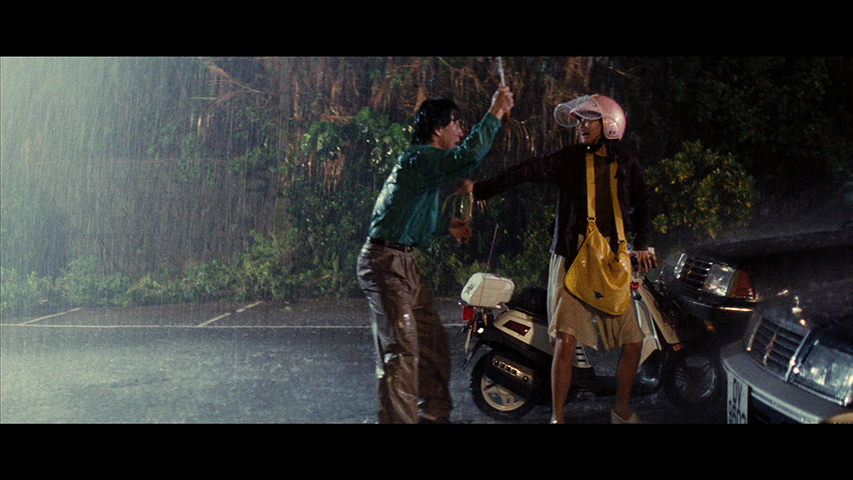
While we don't get a fun English version of the audio, we do get a very different, truncated version of the film, which was released in Hong Kong, presented here with a 1.0 Dolby Digital Cantonese soundtrack and burned-in subtitles. Presented unrestored, but with a high-definition transfer, It's quite a bit shorter and removes several parts of the plot, and as a result moves far faster, though it can feel a bit disjointed as a result. There's something endearing about the lo-fi presentation--with some notable scratches and damage--as it feels more of its time and genre,
Son of the Incredibly Strange Film Show was the second season of a great British TV show hosted by Jonathan Ross in the late ‘80s, where he explored cinema outside the mainstream. In this episode (41:11), from September 1989, Ross interviews Chan and Cheung on the set of Miracles. Using clips from Chan's movies as illustration, the episode covers his career to that point and though it does have a good deal of repetition from the other retrospectives in this set, its strength is the amount of clips provided, as Ross and Chan review footage on a flatbed editor, including Chan's traumatic injury on the set of Armor of God, and the opportunity to hear from his collaborators, including Cheung. Ross approaches the interview less from a cinematic perspective, but rather from a human interest angle.
Hendrix returns for "Reinventing Action" (20:59), in which he discusses how martial-arts films changed over the decades, thanks in part to the influence of Western cinema, and how Western cinema was then influenced by Chan's films. Unfortunately, a lot of what Hendrix shares about Chan's technique is covered in the My Stunts segment on the previous disc, but he still has plenty to say, and the clips of classic martial-arts films are excellent. Perhaps we'll see some of these from Criterion in the future.
Benny Lai, who plays a skilled bad guy who abuses Chan in Police Story 2, gets some spotlight in this archival interview (15:43), in which he talks about his martial-arts background and how he got involved in the film, including how he developed his character and his rather unforgettable "catchphrase".
Chan became the high-end performer he was thanks to the lessons and discipline instilled in him as a child at the China Drama Academy, a training ground similar to the one seen in a segment from a February 1964 episode of Edition spéciale (12:41), which shows the dance, vocal and tumbling instruction the children received at the L'Opéra de Pékin à Paris. It's impressive to see how hard they worked as kids.
A undated stunt reel (4:42), likely from the early ‘90s, is basically a supercut of Chan's trademark end-credit bloopers and stunt footage, taken from several of his 1980s films. It's pretty painful to watch him get injured so frequently.
The final on-disc extra is the original trailer for Police Story 2, checking in at an enormous 3:55. The promo mixes scenes from the film with on-set footage of Chan directing his cast and working out stunts. Like the theatrical trailer for the first film, it reveals far too much of the plot, so skip it if you haven't seen the movie.
The extras wrap up with the 8-panel fold-out pamphlet, which includes, alongside the usual disc and movie details, an essay by writer Nick Pinkerton, who offers background on Chan's films and thoughts on the Police Story films. On the back of the pamphlet is a frame-worthy painted poster of Chan Ka-kui in his motorcycle cop gear.
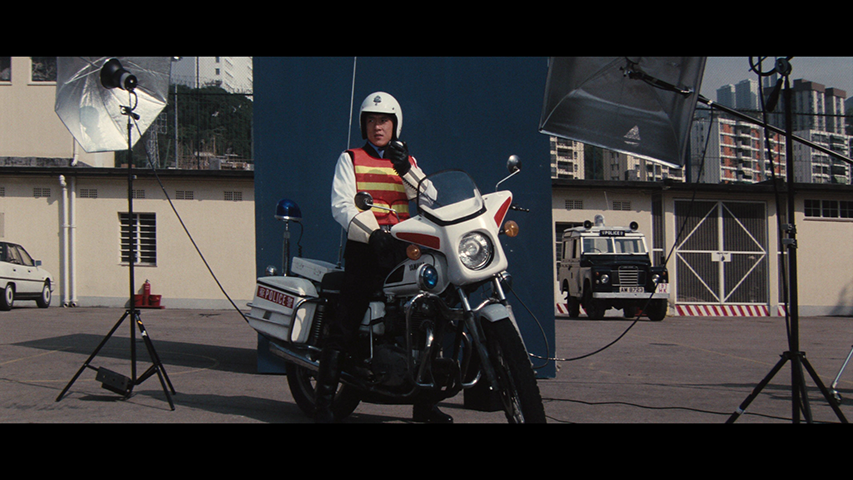
The Bottom Line
Police Story is easily one of the best action comedies you can watch, with outstanding fight scenes combined with Jackie Chan's undeniable charm, even if the storyline is somewhat forgettable and lacks resolution. Police Story 2, on the other hand, sidelines much of the comedy seen in the first film, though at times the action is almost as impressive, and as a result, like most sequels, it can't live up to the original. And while the Criterion release of the two films neither includes all the extras available on previous discs nor corrects some of the concerns fans have had with recent HD releases of the films, the films look and sound great and the package includes a wealth of extras about Chan helping to put the two movies into the context of his career. Newcomers to these films should dive in without hesitation, while those who own one of the previous international releases should review the extras to decide if it's worth the upgrade.
Reviewer's Bias*
Loves: The Criterion Collection, Jackie Chan filmsLikes: Awkward dubs
Dislikes: cop movies
Hates: unmotivated sequels
Francis Rizzo III is a native Long Islander, where he works in academia. In his spare time, he enjoys watching hockey, writing and spending time with his wife, daughter and puppy.Follow him on Twitter
*The Reviewer's Bias section is an attempt to help readers use the review to its best effect. By knowing where the reviewer's biases lie on the film's subject matter, one can read the review with the right mindset.
|
| Popular Reviews |
| Sponsored Links |
|
|
| Sponsored Links |
|
|
| Release List | Reviews | Shop | Newsletter | Forum | DVD Giveaways | Blu-Ray | Advertise |
|
Copyright 2024 DVDTalk.com All Rights Reserved. Legal Info, Privacy Policy, Terms of Use,
Manage Preferences,
Your Privacy Choices | |||||||












